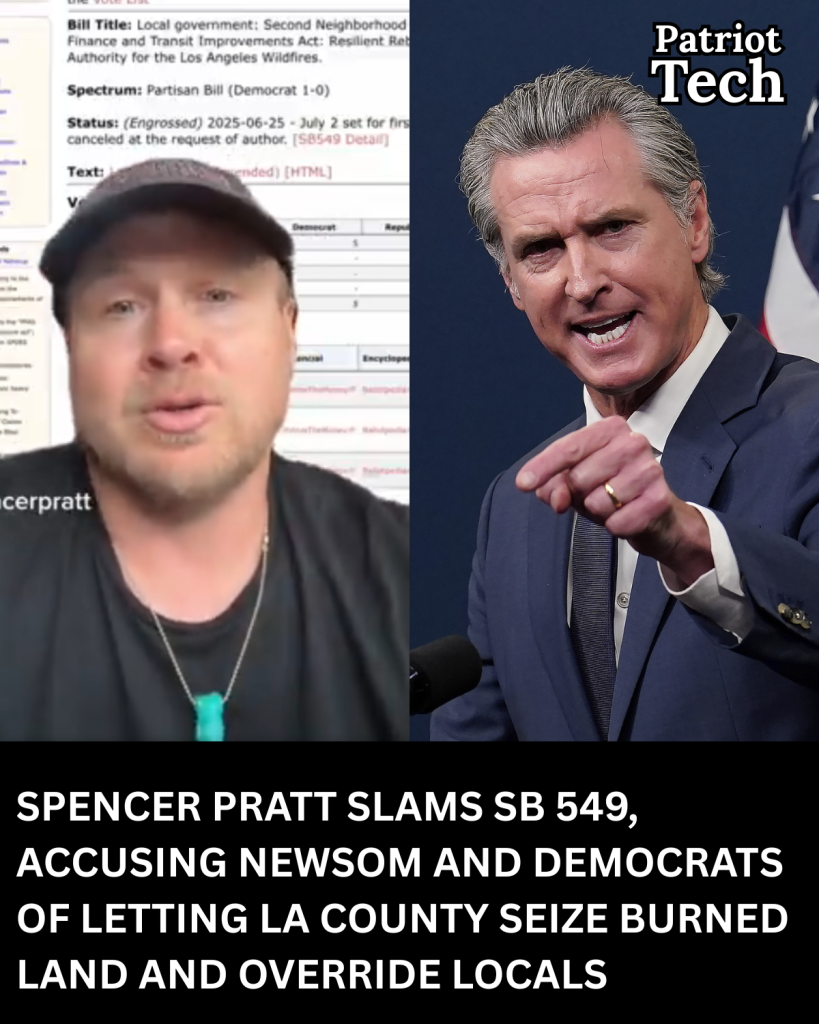BREAKING: HOLLYWOOD STAR TORCHES CALIFORNIA BILL AS LAND GRAB AFTER FIRE
Spencer Pratt, star of The Hills and recent wildfire victim, blasted California Democrats for SB 549 — a bill letting LA County buy fire-ravaged land on the cheap and override local rebuilding.

Pratt called out lawmakers for centralizing power and breaking Gavin Newsom’s promise that the state wouldn’t force low-income housing on destroyed lots.
This move strips local communities of control and forces top-down “resilient” housing mandates — putting unelected bureaucrats in charge of neighborhoods they failed to protect.
Critics say it’s a government land grab that punishes fire victims and fast-tracks dense urbanization without consent.
Pratt’s message: the same officials who watched the Palisades burn down want to control what rises from the ashes.
California’s SB 549 Sparks Outrage Over Fire Zone Property Buyouts and Affordable Housing Mandates
Spencer Pratt, a reality TV personality best known for The Hills, has unexpectedly emerged as a voice of local discontent in Los Angeles following the passage of California Senate Bill 549 (SB 549). The bill, which cleared the California Senate this month, grants sweeping new authority to LA County to acquire and redevelop properties destroyed by wildfires—prompting concerns among fire victims, homeowners, and community activists about property rights, local control, and long-term neighborhood impacts.
SB 549 allows LA County to purchase fire-damaged or destroyed lots at minimal cost and repurpose them for new development, with a legal mandate that 40% of the rebuild must include affordable housing. Beginning in January 2026, the bill also permits local governments to allocate a portion of future property tax revenues into special infrastructure finance districts to support these projects.
This move directly contradicts earlier public assurances made by California Governor Gavin Newsom, who had promised that homeowners displaced by wildfires would not see their properties forcibly converted into government-backed affordable housing projects. The backlash, now spreading on social media and amplified by local celebrities like Pratt, stems from what critics describe as a betrayal of trust and an erosion of property rights.
One of the bill’s most controversial aspects is the creation of a “Resilient Rebuilding Authority” for LA County. This county-level entity would have decision-making power over zoning and land use in disaster recovery zones, effectively overriding existing city authority and public input processes. Critics argue this strips local communities of their say in how neighborhoods are rebuilt and paves the way for high-density housing projects that do not reflect the character or needs of the original communities.
In neighborhoods like Pacific Palisades, where wildfire destruction has been devastating, the legislation has ignited fears of permanent displacement. SB 549 enables “land banking” by the county, offering original property owners a so-called “first look” at repurchasing their land. However, affordability remains a key barrier. If the rebuilt homes are priced out of reach, former residents—especially those without insurance or with partial coverage—could lose their homes forever. Critics argue that the result could be forced gentrification under the guise of resilience and affordability.
The bill also loosens traditional zoning controls to promote “resilient” projects, such as infill housing near transit lines, often bypassing the usual local review processes. While proponents argue this is necessary to meet California’s long-term housing and climate goals, residents warn of infrastructure strain, traffic congestion, and community displacement due to densification and reduced public oversight.
Pratt, who reportedly lost his Pacific Palisades home in the recent fires, voiced his frustration in a public post, alleging the same state and local officials who failed to prevent the fires are now trying to profit from the aftermath. “The people that are in charge of this bill, they’re the people in charge of letting the whole town burn down,” he said. His remarks underscore a broader sentiment growing among fire victims: that the bill may prioritize state housing objectives over recovery justice for impacted communities.
Though the legislation does include language about public transparency and housing opportunity, opponents warn that the pace and scope of the bill’s implementation risk leaving vulnerable families behind. Legal analysts have also noted that critics may pursue constitutional challenges, especially around provisions that allow compulsory land acquisition and mandate low-income development targets.
As the bill awaits final approval and potential implementation frameworks, public meetings and community protests are expected to ramp up across LA County. The central theme emerging from the backlash is not opposition to affordable housing per se, but deep concern over the loss of local control, lack of consent in redevelopment decisions, and fears of irreversible changes to wildfire-hit communities.
SB 549 may mark a turning point in California’s ongoing housing and climate resilience efforts—but it has done so by igniting a political firestorm among those still sifting through the ashes of their lost homes.